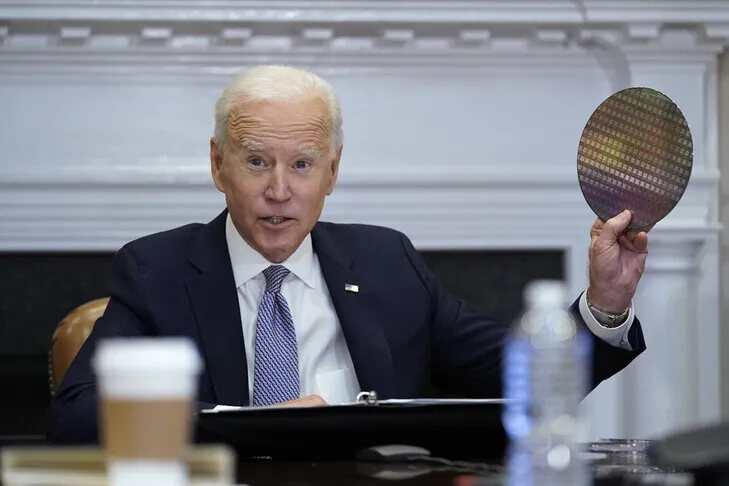hankyoreh
Links to other country sites 다른 나라 사이트 링크
With deadline looming, S. Korean chipmakers will partially comply with US’ data demand

The deadline for submitting major internal data on semiconductor supply chains requested by the US government in September is now just four days away. Domestic chipmakers, which have voiced dismay over this unprecedented demand, are expected to submit their data in a way that will minimize the exposure of sensitive information.
According to reporting by the Hankyoreh published Wednesday, domestic chip giants like Samsung Electronics and SK Hynix will submit data to the US Department of Commerce by the Monday deadline so long as the information does not violate non-disclosure agreements with customers.
Following a White House summit on Sept. 23 on semiconductor supply chains, the department asked semiconductor makers worldwide to fill out a questionnaire with information on major customer lists, sales share, inventory and yield. The move sparked controversy, with critics calling it a method of uncovering trade secrets rather than gauging chip supply and demand.
The Korean government, which has attempted last-minute mediation between domestic companies and Washington, is of the opinion that it is unlikely chipmakers will provide a level data to the US that would be cause for concern about leaks of confidential information.
Choi Woo-seok, director-general for materials and components industries at the Ministry of Trade, Industry and Energy, told the Hankyoreh over the phone, “Companies are voluntarily honoring [the US request] so no violation of domestic law such as the Trade Secret Protection Act will occur. The understanding is that most information that could pose problems in contracts with customers will not be submitted.”
The industry is sympathetic to the US objective of supply chain stabilization, which is the justification for the request, but its response has shown concern given that this situation is unprecedented.
Ahn Ki-hyun, executive director of the Korea Semiconductor Industry Association, said, “The [Korean] government has never requested this data before, so companies are in a difficult position. Though as suppliers these global companies should work to help stabilize semiconductor supply, the appearance of an unforeseen procedure has fueled worry.”
Samsung Electronics Vice Chairman Kim Ki-nam on Oct. 26 told reporters at the Korea Electronics Show in Seoul, “We are carefully preparing [for the US request for information], taking into account a number of factors.”
The most sensitive data in the eyes of global semiconductor companies is their lists of major customers and output volume. Investors often discuss the numerous clients of Samsung and SK, but with the exception of large trading partners, these corporations have never disclosed who their major clients are, with product supply data for each client remaining confidential.
In addition, semiconductor inventory is difficult to accurately estimate from the outside, which allows companies to negotiate prices with buyers.
The government of Taiwan — home to the world’s largest semiconductor foundry in Taiwan Semiconductor Manufacturing Co. (TSMC) — has publicly opposed the US request. But foreign reports say TSMC will reverse its resistance to the demand and submit the data.
One view is that Korean companies believe the Biden administration's “excessive demand” did not specifically target them, thus they agreed to it.
A Korean government official said that the US inspection of semiconductor supply chains “arose due to a shortage of automotive semiconductors, but Korean companies mainly sell memory products. Since this has little to do with system semiconductors [that the US needs], the US doesn't seem to think much of [memory semiconductor companies].”
Kim Yang-paeng, a researcher at the Korea Institute for Industrial Economics and Trade, said, “To restore operations of its car industry — its main industrial sector with the largest number of workers — the US is taking issue with the semiconductor supply chain. I believe that once this problem is resolved, [the US request for information] may blow over as well.”
By Sun Dam-eun, staff reporter
Please direct questions or comments to [english@hani.co.kr]

Editorial・opinion
![[Editorial] Korea, US need a ‘gentlemen’s agreement’ on what job creation entails [Editorial] Korea, US need a ‘gentlemen’s agreement’ on what job creation entails](https://flexible.img.hani.co.kr/flexible/normal/482/289/imgdb/original/2025/0911/9717575780802784.jpg) [Editorial] Korea, US need a ‘gentlemen’s agreement’ on what job creation entails
[Editorial] Korea, US need a ‘gentlemen’s agreement’ on what job creation entails![[Column] Why MAGA has its eyes set on Korea [Column] Why MAGA has its eyes set on Korea](https://flexible.img.hani.co.kr/flexible/normal/500/300/imgdb/original/2025/0911/2117575773523233.jpg) [Column] Why MAGA has its eyes set on Korea
[Column] Why MAGA has its eyes set on Korea- [Column] Lee still has his work cut out for him after summit with Trump
- [Editorial] Is this any way for the US to treat an ally?
- [Column] Lee’s difficult task of striking a balance on Japan
- [Editorial] Multipolar era means Seoul must broaden its diplomacy
- [Column] North and South Korea are no longer pawns in US-China-Russia relations
- [Column] Who we fail when we oversimplify the ‘comfort women’ issue
- [Column] How Seoul can navigate its security in a shifting world order
- [Editorial] Former first lady’s indictment is consequence of her acting as though she were president
Most viewed articles
- 1Seoul says US must fix its visa system if it wants Korea’s investments
- 2[Column] Why MAGA has its eyes set on Korea
- 3MAGA’s traveling circus comes to Korea
- 4Korea’s own MAGA evangelist brings American far right to Korean church youth
- 5Korean workers detained in ICE raid could depart US as early as Wednesday
- 6Construction hits delays at 4 LG Energy battery plants in US after Georgia raid
- 7Korea mulls how to respond if US demands ‘strategic flexibility’ of USFK at summit
- 8[Editorial] Korea, US need a ‘gentlemen’s agreement’ on what job creation entails
- 9A week after ICE raid, 300+ Koreans head to airport upon release
- 10Korean workers’ return held up by Trump’s proposal that they stay in US, Seoul says